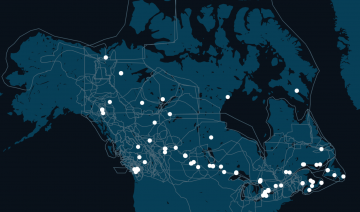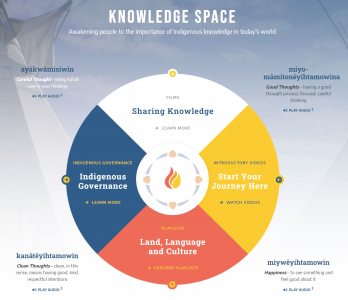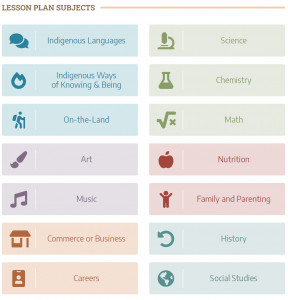The National Centre for Collaboration in Indigenous Education (NCCIE) is hosted by First Nations University of Canada, which has a 40-year history of being Indigenous-owned, operated, and controlled. The Centre is grounded in principles of respect, reciprocity, and relationship, which are understood in Indigenous ways and honoured according to Indigenous protocols and customs. The NCCIE website features many digital resources to connect communities with each other and share their stories about Indigenous education across Turtle Island and the world. In the following video learn how to navigate the fantastic website of the NCCIE.
As you learned from the video, the NCCIE website features an interactive map that highlights innovative and exciting examples of Indigenous education. You can use the NCCIE interactive map to display stories and illustrate regions by treaties, languages and territories. Watch videos that celebrate the dedicated work by communities, leaders, educators, Elders, Knowledge holders, practitioners, policymakers and researchers to strengthen Indigenous education for all generations. The NCCIE website shares this collaborative networking to advance the success of Indigenous education across Turtle Island and to support efforts that move us towards reconciliation.
With a mandate to support and encourage a strong presence for collaboration in Indigenous education, the NCCIE website is meant to serve as a gateway for educators and anyone interested in Indigenous education and reconciliation. In its aim to further reconciliation objectives, the Reconciliation and NCCIE webpage provides educators with reflections of Indigenous peoples experiences living with the inter-generational impacts from residential schools. Listening to these stories allows us to learn from others to break down barriers and work to dissolve stigma and stereotypes. In the following NCCIE video, listen to Willie Ermine talk about reconciliation from an Indigenous perspective.
The Elders of kêhtê-ayak, the Elders’ Council of First Nations University of Canada, welcome us, and in choosing to share some of their knowledge, they ask that we kindly practice careful thought. The expanding digital age has given a way to privilege voices and through documentary filmmaking, the Elders of kêhtê-ayak have contributed to the creation of a Knowledge Space. This Knowledge Space is meant to awaken people to the importance of Indigenous knowledge in today’s world. Much careful thought – ayâkwâmisiwin – has gone into the creation of this Knowledge Space and it is just a beginning. Click on – “Introductory Videos” – and begin your learning journey with the videos found in the eastern direction of the circle.
One of the core messages heard during NCCIE’s first year is how important languages are to First Nations, Métis and Inuit Peoples and the central role languages play when passing on knowledge and culture through Indigenous education. To reflect this close relationship between Indigenous languages and Indigenous education, and in support of the United Nations Declaration, NCCIE has initiated a number of Indigenous languages projects. NCCIE contemplated how to better represent Indigenous languages and have more Indigenous languages heard on the website. A pilot project called: ‘Hear Indigenous Languages’, has been created along with other Indigenous Languages initiatives as a result. Click below to explore these initiatives.
The NCCIE website includes a searchable database which features a diverse array of documents and on-line resources about and for Indigenous education. NCCIE researchers have generated digital resources on what they could find in their respective regions. In order to respect the diversity of peoples and voices across the country, the Centre privileges community voices, listening to and respecting their perspectives and interests. You can also search for interviews and reflections of Indigenous participants’ and regional team members’ about their involvement in NCCIE and how to contribute to strengthening Indigenous education. In the following interview, Elder Mary Jane Joe shares her vision for Indigenous education and explains the importance of future generations maintaining the knowledge of their elders to keep their traditions alive.
Finally, the NCCIE website also features a Teaching Resource Centre! The educational resources you find here are for Indigenous and non-Indigenous educators teaching students and learners of all ages. In the Teaching Resource Centre, you will find lesson plans developed with an Indigenous perspective for teaching Indigenous, land-based skills and knowledge, Indigenous languages, and mainstream K-12 subjects infused with Indigenous knowledge. This lesson plans are adaptable for professional development opportunities with videos that can be used as part of lesson plans or on their own and helpful materials for educators to evaluate your and your learners’ experiences with a lesson and create your own lesson plans using templates with an Indigenous-based, student-centred approach.



